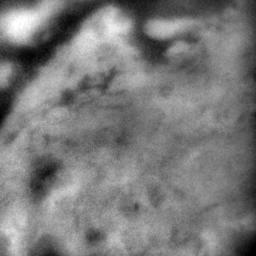
|
Closing in on Titan
- Click the image above for a larger view
- Full-Res JPEG (928 x 928) (103.7 kB)
- Full-Res TIFF (928 x 928) (862.3 kB)
Caption:
Titan's veil begins to lift as Cassini's cameras peer through the hazy moon.
This image acquired at a range of 344,000 kilometers (213,700 miles) shows details at Titan's surface never seen before. The image shows only surface brightness no topographic shading. The finest features are less than 10 kilometers (6 miles) across. In other areas the surface boundaries are less distinct perhaps due to different geologic process or atmospheric effects. There are some linear features that could be impact craters but the fact that many features are linear suggests that other geologic processes are shaping the surface.
Background Info:
The Cassini-Huygens mission is a cooperative project of NASA, the European Space Agency and the Italian Space Agency. The Jet Propulsion Laboratory, a division of the California Institute of Technology in Pasadena, manages the Cassini-Huygens mission for NASA's Office of Space Science, Washington, D.C. The Cassini orbiter and its two onboard cameras, were designed, developed and assembled at JPL. The imaging team is based at the Space Science Institute, Boulder, Colo.
For more information, about the Cassini-Huygens mission visit, http://saturn.jpl.nasa.gov and the Cassini imaging team home page, http://ciclops.org .
Cataloging Keywords:
| Name | Value | Additional Values |
|---|---|---|
| Target | Titan | |
| System | Saturn | |
| Target Type | Satellite | |
| Mission | Cassini-Huygens | |
| Instrument Host | Cassini Orbiter | |
| Host Type | Orbiter | |
| Instrument | Imaging Science Subsystem (ISS) | |
| Detector | ||
| Extra Keywords | Atmosphere, Crater, Grayscale, Haze, Impact | |
| Acquisition Date | ||
| Release Date | 2004-07-03 | |
| Date in Caption | ||
| Image Credit | NASA/JPL/Space Science Institute | |
| Source | photojournal.jpl.nasa.gov/catalog/PIA06111 | |
| Identifier | PIA06111 | |
